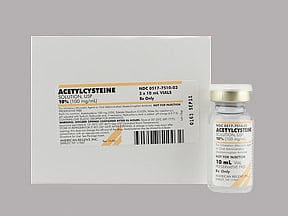
Acetylcysteine Coupons & Savings Card – Discount Prices from $1.45
Generic for: Nac 600, Nf formulas nac, Nac
My prescription
Edit
10ML of 10%, Acetylcysteine (1 Glass Cont)
Select pharmacy

CVS
$27.59
COUPON PRICE
Walmart
$1.45
COUPON PRICE
Walgreens
$12.10
COUPON PRICE
Albertsons
$14.68
COUPON PRICEAcetylcysteine savings card
Show this card to your pharmacist
Walmart
$1.45
BIN
ID
PCN
GRP
019876
LH72F12635
CHIPPO
LHX
Powered by
More prescriptions for upper respiratory infection
More prescriptions for upper respiratory infection
Price history for Nac (brand) & Acetylcysteine (generic)
1 Glass Cont, 10ML of 10%
Average retail price for Nac
Average retail price for Acetylcysteine
Average SaveHealth price for Acetylcysteine
Our price history data is based on aggregated prescription data collected from participating pharmacies in America. Our prescription data updates daily to reflect the latest price changes. If you notice a missing data point, it means there wasn't sufficient data available to generate a monetary value for that date.
We analyzed Acetylcysteine prices for (10ML of 10%, 1 Glass Cont) over the last 12 months. The average retail price was $51.68, while the average price using the SaveHealth discount card was $19.83. That's a savings of approximately 61.63% when using our Acetylcysteine coupon.
Compared to the generic version, Nac had an average price of $267.00 over the same time period. With the SaveHealth savings card, Acetylcysteine is 92.57% cheaper on average than Nac.
*Retail prices are based on pharmacy claims data, and may not be accurate when we don't have enough claims.
Acetylcysteine dosage forms
Dosage Quantity Price from Per unit 10ML of 10% 1 Glass Cont $1.45 $1.45 10ML of 10% 2 Glass Conts $7.88 $3.94 10ML of 10% 3 Glass Conts $14.32 $4.77
| Dosage | Quantity | Price from | Per unit |
|---|---|---|---|
| 10ML of 10% | 1 Glass Cont | $1.45 | $1.45 |
| 10ML of 10% | 2 Glass Conts | $7.88 | $3.94 |
| 10ML of 10% | 3 Glass Conts | $14.32 | $4.77 |
Acetylcysteine Warnings
This medication comes with several important safety warnings that you should be aware of. It is crucial to understand these risks and discuss any concerns with your healthcare provider.
- Increased Mucus Production: Taking acetylcysteine may lead to an increase in liquid mucus in your airways, which can be difficult to expel. This is particularly significant for individuals with asthma, as it could potentially trigger an asthma attack. It is advisable to keep your rescue inhaler accessible when using acetylcysteine.
Please ensure you consult with your healthcare professional for further guidance tailored to your specific health needs.
Acetylcysteine Side Effects
Common side effects:
- Nausea
- Vomiting
- Coughing
- Runny nose
- Mouth sores
- Irritation of the lips
- Sore throat
Less common but important to monitor:
- Drowsiness
- Clamminess
- Fever
Serious side effects:
- Severe stomach or abdominal pain
- Black stools
- Vomit resembling coffee grounds
- Chest pain
- Tightness
- Trouble breathing
- Rash
- Itching or swelling
- Severe dizziness
- Difficulty breathing
Acetylcysteine Interactions
Interactions with moderate risk that may require dose adjustment, closer monitoring, or timing changes:
